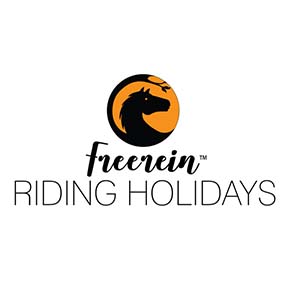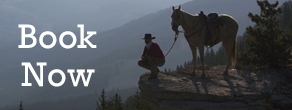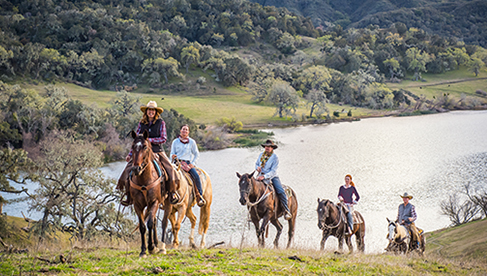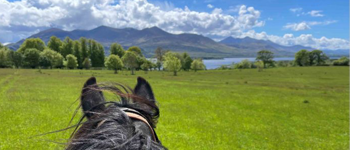Rural Veterinary Experience, Teaching, and Service (RVETS)
Have you ever thought about giving back to the equine community? Read about RVETS, an organization that teaches volunteers about veterinary medicine in underserved communities in the U.S. and abroad.
by Jocelyn Pierce
with photos from Jim Westin
Dr. Eric Davis and his wife Cindy are on the road more than 12 weeks a year, providing veterinary care in underprivileged communities while building volunteers’ confidence and experience as effective equine health professionals. The Davises are the founders of Rural Veterinary Experience, Teaching, and Service (RVETS) a 501C-3 nonprofit organization that relies solely on volunteers and donations. Eric and Cindy see their work not as a job, but a cause. Selflessly dedicated to helping others, they take deep satisfaction from involving students in volunteer projects while helping them to learn their craft through practical experience.

Eric Davis, DVM, DACVS, DACVIM has a passion for teaching students and helping animals in underserved communities.
The Evolution of RVETS
RVETS has been an ongoing 35-year evolution for Eric Davis, DVM, MS, DACVS, DACVIM. His passion for teaching students and helping animals living in underserved, rural communities has been a driving force throughout his career. A graduate of the University of California School of Veterinary Medicine, Davis is also a Diplomate of both the American College of Veterinary Surgeons and the American College of Veterinary Internal Medicine.

The RVETS bus is passed by trucks on a newly built road in the Fort Berthold Reservation in North Dakota.
Prior to his veterinary education, Davis had been a farrier. He has since worked in a broad veterinary capacity, including practices, academia, and various animal welfare programs.
Co-founder Cindy Davis has a strong equine background with years of experience as a surgical assistant, field anesthetist, and veterinary nurse. The students that volunteer with RVETS are moved by the dedication of Eric and Cindy Davis.
Russ Sakai, DVM volunteered at Pine Ridge Reservation between his second and third year of veterinary school. “I think the devotion Eric and Cindy Davis show to students and the work they do will always stay with me. They played a huge part in the direction I have taken in veterinary medicine so far, and I will always be grateful for that.”

Rural Veterinary Experience, Teaching and Service (RVETS) is a 501C-3 non-profit organization. Students improve skills in horse handling, physical exams, disease and parasite prevention, castration techniques, anesthesia, dentistry, lameness diagnosis, wound care, and hoof trimming.
Davis first practiced in a remote setting at a large Indian Reservation in northern California where he provided low cost and free work. Davis left his private practice to become a faculty member at the University of Tennessee in 1994, and trained veterinary students there until 2001. While a faculty member, Davis began working on a rabies control program at Rosebud Indian Reservation in South Dakota. He brought students along and saw how much they learned. This led to the beginning of Remote Area Medical Veterinary Services, which provided veterinary care on Indian Reservations, in the rural areas around the University of Tennessee, and Guatemala.
This program eventually developed into Rural Area Veterinary Services (RAVS), and when Davis resigned from his position at the University of Tennessee, The Humane Society took the program over. RAVS is a successful organization that exists today, treating thousands of animals every year, concentrating mostly on small animal spaying and neutering. Davis returned to UC Davis where he is currently employed and serves as a veterinarian for the International Animal Welfare Training Institute, which educates, trains, and discusses ways to positively impact animal health and welfare.

Students gain confidence, experience, and lasting memories from their volunteer work with RVETS.
Where RVETS Works
Many impoverished communities have no access to veterinary care, which affects the welfare of their horses. RVETS concentrates their resources in three separate subprograms in need of veterinary support; Indian Reservations in North and South Dakota, Mexico, and Nicaragua.
RVETS volunteers for 7 to 8 weeks annually on five Indian Reservations in North and South Dakota, where Dr. Davis has contacts that go back fifteen years. Two-time RVETS volunteer Sami Pederson, DVM, recognizes the importance of providing service work to local communities. Pederson states, “the reservations of the central U.S. have some of the highest poverty and lowest education levels, especially at Pine Ridge. The services provided to them are invaluable and so gratefully appreciated.”

In 2012, RVETS treated close to 3,000 animals, preforming over 700 castrations.
RVETS also travels to Guanajuato, Mexico twice a year for two weeks at a time, where they are in the process of building a clinic and have relations with a local veterinary school. Dr. Davis hopes to see Mexican and U.S. students working side by side in the future.
In Nicaragua, RVETS offers support to local veterinarians, students, and the organization NicaVets by helping them upgrade their skills and improve their services. RVETS plans to purchase a bus to be used as a mobile clinic to better service the remote area.

“I am a huge fan of Eric & Cindy, RVETS, and the wonderful work they do for people, for animals, and for students”-Jim Westin
What’s it like to Volunteer with RVETS?
Dr. Davis aims to provide students with the best learning experience possible. He believes many veterinary students are starved for hands on experience in routine procedures, and while working with RVETS, they perform hundreds of them.

RVETS volunteers at Indian Reservations in North in South Dakota, and also in Mexico and Nicaragua.
Greg Schmid, DVM, had just finished his 2nd year of veterinary school at the Ohio State University when he volunteered with RVETS. “As soon as I heard about RVETS I made it a priority to volunteer. I have always loved horses and knew RVETS would be a way for me to benefit horses in need with the resources I could offer (labor and time). It was a perfect way to get hands on veterinary experience with great mentorship.”
Lilly Haywood, VMD, currently an ambulatory intern at Rood and Riddle, sees RVETS as “an incredible experience in all aspects. I've gotten to know veterinary students around the country, seen and met people in an area of the world that I probably wouldn't have otherwise, and gotten experience with field surgery and procedures that we don't get a ton of experience with while in school.

“Dr. Davis and Cindy had everything arranged, prepared great learning materials for us, and made sure we had everything we needed during the trip. It was fun, exciting, and there was a great feeling of camaraderie between everyone.” -Greg Schmid, DVM
Dr. Davis gives students responsibilities, which helps them with decision-making and confidence. Haywood has volunteered with RVETS three times. As one of the youngest students on her first trip to Pine Ridge Reservation, she was nervous she would make a mistake and had no self-confidence. Because of her volunteer work with RVETS, Haywood’s confidence has grown exponentially each year. The responsibilities and procedures students perform gives them a glimpse of what its actually like to be a veterinarian.
“These trips provided some of the first opportunities that I felt DVMs trusted my knowledge base and skill set, and communicated with me as a colleague (or future one) rather than simply a student,” says Pederson.

For me, the most important thing I took away from this trip was confidence in my clinical skills. Up to that point in my veterinary career, instruction had been in the classroom or very controlled environments. This was a whole different experience, we were in the field, implementing anesthetic protocols and performing surgery” -Russ Sakai, DVM
RVETS volunteer work isn’t a vacation. The work is physically taxing, fast paced, with long hours out in the elements. Meals and showers are not guaranteed and volunteers sleep in buses, camp out, or stay with community members.
Pederson hadn’t had much equine experience starting veterinary school. She wanted to volunteer to provide service work and “was looking forward to the trip as a mean to learning some medicine, getting experience, and being able to spend some good time outdoors doing hard work.” Pederson continues, “the hours are long, and the physical work is hard, but when you see a mini walk 'normally' for the first time in years after having his 'elf shoes' sawed off and his hooves rasped, there's no better feeling."
Volunteers typically perform physical exams, castrations, vaccinations, anesthesia, dentistry, wound care, hoof work, lameness diagnosis, and learn about horse handling and disease and parasite prevention. A lot of the horses RVETS work on are bred to be bucking stock; they are unhandled and turned out all of the time. Some are mean and pretty much all are essentially wild animals, posing a challenge to veterinarians. Students agree that the horsemanship skills they learned were a major advantage to the program.

“Each year my confidence has grown exponentially. I feel like an appropriate amount of self-confidence is one of the determining factors in a young veterinarian's success; R-Vets has helped me so much in this regard!” -Lilly Haywood, VMD
Students experience transformative personal growth through their learning opportunity with RVETS. “The biggest reward was having this great opportunity to help so many horses. Dr. Davis and Cindy had everything arranged, prepared great learning materials for us, and made sure we had everything we needed during the trip. It was fun, exciting, and there was a great feeling of camaraderie between everyone,” says Schmid. Pederson also had an incredible experience with RVETS, admitting “it's practically an understatement to say that it was life-changing, but working with Cindy and Dr. Davis, as well as the trip participants and the people we served really impacted the types of veterinary work I continued doing throughout school.”

Students are exposed to communities and areas that might not have ever known existed.
While it’s not necessary to have a veterinary background to volunteer, RVETS prioritizes teaching veterinary students and even pre-veterinary or veterinary technician students. Volunteers are not selected on a first come basis, they are chosen with varying degrees of skill to balance trips, with a limited number of available positions.
“I would highly recommend these trips to anyone looking to further their knowledge base and experience. Even if equine isn't your passion, you'll gain skills from these trips that translate across all species,” Pederson states.

Husband and wife team Eric Davis, DVM and Cindy take part in the “potato dance” at Standing Rock Reservation.
Apply to volunteer. If service work isn’t for you, consider making a tax-deductible donation to RVETS on their website.
About the Author: Jocelyn Pierce is an avid equestrian and lover of travel and photography. Her passion for adventure has led her on numerous excursions throughout North America and Europe. When she’s not riding and competing her homebred mare, she enjoys hiking, camping, and snapping photographs.




